
SusMat
Scope & Guideline
Transforming Ideas into Sustainable Practices
Introduction
Aims and Scopes
- Sustainable Materials Development:
The journal emphasizes the development and characterization of materials that are environmentally friendly and contribute to sustainability, including polymers, composites, and nanomaterials. - Energy Storage and Conversion:
A significant focus is placed on materials and technologies that improve energy storage systems, such as batteries and supercapacitors, as well as energy conversion technologies like fuel cells and solar cells. - Catalysis and Chemical Processes:
Research on catalysts that facilitate sustainable chemical processes, including electrocatalysis and photocatalysis for energy generation and chemical production, is a prominent theme. - Advanced Characterization Techniques:
The journal showcases novel methodologies for characterizing materials at various scales, which are critical for understanding their properties and optimizing their performance in applications. - Interdisciplinary Approaches:
'SusMat' encourages interdisciplinary research that combines principles from materials science, chemistry, physics, and engineering to address complex sustainability challenges.
Trending and Emerging
- Green Chemistry and Sustainable Synthesis:
There is a growing emphasis on green chemistry principles, including the development of sustainable synthesis routes for materials that minimize waste and utilize renewable resources. - Energy-Efficient Technologies:
Recent publications indicate a trend towards materials and technologies that enhance energy efficiency, particularly in energy storage systems and energy conversion applications. - Biodegradable and Renewable Materials:
An increasing focus on biodegradable materials and those derived from renewable resources suggests a shift towards reducing environmental impact and promoting sustainability in materials design. - Advanced Functional Materials for Electronics:
The rise of flexible and wearable electronics is reflected in research on advanced functional materials, highlighting the importance of materials that integrate seamlessly into everyday technologies. - Nanotechnology in Sustainable Applications:
Emerging research on nanomaterials and their applications in sustainability, including environmental remediation and energy harvesting, indicates a trend towards leveraging nanoscale innovations for broader impacts.
Declining or Waning
- Traditional Energy Materials:
Research related to conventional energy materials, such as fossil fuel-based systems, has seen a decline as the journal shifts towards more sustainable alternatives like renewable energy sources. - Basic Polymer Research:
While polymer science remains relevant, the emphasis on basic polymer research without applications in sustainability or advanced technologies appears to be waning in favor of applied and innovative polymer solutions. - Single-Use Materials:
The focus on materials that are not recyclable or biodegradable is decreasing, aligning with global trends towards sustainability and circular economy principles. - Low-Impact Manufacturing Processes:
Research on traditional manufacturing processes that have a higher environmental impact is declining as the journal promotes innovations in sustainable production techniques.
Similar Journals
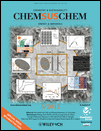
ChemSusChem
Exploring the Frontiers of Sustainable ChemistryChemSusChem is a premier interdisciplinary journal, published by WILEY-V C H VERLAG GMBH, that focuses on the critical fields of Chemical Engineering, Energy, Environmental Chemistry, and Materials Science. Since its inception in 2008, the journal has consistently maintained a Q1 ranking across multiple categories, highlighting its role as a vital resource for researchers and professionals dedicated to advancing sustainable chemical processes and technologies. With an impressive impact factor, it ranks 12th in General Chemical Engineering and is highly regarded within its scopes, indicating the journal's commitment to publishing high-quality, innovative research that addresses global challenges in energy and environmental sustainability. Though it operates on a subscription model, its contributions are essential for those in academia and industry seeking cutting-edge developments in sustainable chemistry. As it approaches its convergence span through 2024, ChemSusChem continues to shape the future of sustainable chemistry, making it a must-read for students, researchers, and practitioners alike.
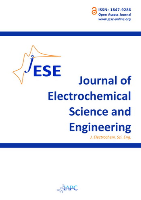
Journal of Electrochemical Science and Engineering
Pioneering Knowledge in Electrochemical Technologies.The Journal of Electrochemical Science and Engineering, published by the International Association of Physical Chemists (IAPC), serves as a vital resource for researchers and professionals in the fields of electrochemistry, materials chemistry, and chemical engineering. With an Open Access model since 2011, this journal ensures that groundbreaking research is freely accessible to a global audience, promoting collaboration and knowledge sharing. Situated in Croatia, it showcases cutting-edge developments while focusing on applied aspects related to electrochemical technologies. Notably, the journal holds a commendable Scopus ranking, placing it within the Q3 quartile for multiple categories, including Chemical Engineering (miscellaneous) and Electrochemistry. By fostering innovative research and comprehensive reviews, the Journal of Electrochemical Science and Engineering plays a crucial role in advancing the understanding and application of electrochemical processes, making it an indispensable platform for academics and practitioners alike.

ADVANCED FUNCTIONAL MATERIALS
Advancing Knowledge in Biomaterials and NanotechnologyADVANCED FUNCTIONAL MATERIALS is a leading journal published by WILEY-V C H VERLAG GMBH, prominently recognized in the fields of biomaterials, chemistry, condensed matter physics, and materials science. With an impressive impact factor and a distinguished position in the Q1 quartile across multiple categories including nanoscience and nanotechnology, this journal serves as a vital platform for researchers and professionals committed to innovating in functional materials. Since its inception in 2000, ADVANCED FUNCTIONAL MATERIALS has published high-quality peer-reviewed articles that push the boundaries of materials science, exploring new frontiers in electronic, optical, and magnetic materials. The journal's dedication to open access ensures that its groundbreaking findings are readily available to a global audience, fostering collaboration and knowledge-sharing among scholars and practitioners in the field. For those seeking to stay at the forefront of materials research, ADVANCED FUNCTIONAL MATERIALS is an essential resource.
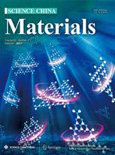
Science China-Materials
Empowering Discovery in Materials Science.Science China-Materials is an esteemed peer-reviewed journal dedicated to advancing the field of materials science, published by SCIENCE PRESS. With a strong focus on innovative research and applications, this journal provides an essential platform for disseminating groundbreaking findings in materials development, characterization, and engineering. Since its inception, Science China-Materials has achieved an impressive Q1 ranking in the Materials Science (miscellaneous) category, reflecting its commitment to quality and the impact of its publications, as indicated by its 86th percentile ranking in Scopus. The journal is set to converge its contributions from 2016 to 2024, making it a vital resource for researchers and professionals interested in the latest advancements and trends in materials science. As an open access publication, it ensures that knowledge is freely available to a global audience, promoting collaboration and innovation across disciplines. The journal is headquartered in Beijing, China, and continues to attract high-quality submissions from leading experts in the field.

Frontiers in Materials
Unveiling Breakthroughs in Material Technologies.Frontiers in Materials, an esteemed journal published by FRONTIERS MEDIA SA, is a leading platform in the field of Materials Science, with a notable impact factor placing it in the Q2 category of its discipline as of 2023. Since its establishment as an Open Access journal in 2014, it has fostered considerable academic exchange, allowing researchers from around the globe to share their innovative findings and insights. Based in Lausanne, Switzerland, this journal not only emphasizes high-quality peer-reviewed articles but also prioritizes rapid dissemination of research, as evidenced by its commendable Scopus ranking of #62 out of 196 in Materials Science (miscellaneous). By consistently striving to bridge the gap between academia and practical applications, Frontiers in Materials serves as an invaluable resource for researchers, professionals, and students seeking to delve into cutting-edge advancements and transformative applications in materials science.
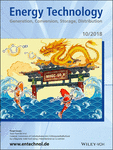
Energy Technology
Driving Progress in Energy Efficiency and SustainabilityEnergy Technology, published by Wiley-VCH Verlag GmbH, is a prominent peer-reviewed journal dedicated to advancing the field of energy research and technology. With an ISSN of 2194-4288 and an E-ISSN of 2194-4296, this journal has made a significant impact in the energy sector, holding a Q2 category ranking in the Energy (miscellaneous) category for 2023, and proudly positioned in the 77th percentile within the Scopus ranking for General Energy. Since its inception in 2013, Energy Technology has consistently published cutting-edge research, innovations, and reviews that cater to a wide array of topics including renewable energy, sustainable technologies, and energy efficiency. The journal does not offer open access, yet it remains a key resource for researchers, professionals, and students who are committed to exploring the dynamic field of energy. The journal's efforts to disseminate rigorous scholarship make it an invaluable asset for anyone looking to contribute to or understand the future of energy-related technologies until 2024.

TRANSACTIONS OF TIANJIN UNIVERSITY
Exploring innovative solutions through collaborative inquiry.TRANSACTIONS OF TIANJIN UNIVERSITY, published by SpringerNature, is a premier journal in the field of multidisciplinary research, boasting an impressive Q1 ranking and placing within the top 93rd percentile of its category according to Scopus. With an ISSN of 1006-4982 and E-ISSN of 1995-8196, this journal facilitates insightful and innovative contributions that span various disciplines, making it a vital resource for academics and professionals alike. Established in 2004, the journal continues to thrive with a commitment to advancing knowledge and fostering collaboration in scientific inquiry. TRANSACTIONS OF TIANJIN UNIVERSITY aligns with global research trends and offers a platform for the dissemination of high-quality research findings, promoting interdisciplinary approaches to solving complex problems. Located in China, its influence extends well beyond national borders, appealing to a diverse readership eager to explore the latest advancements and discussions in the multidisciplinary arena.
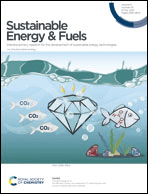
Sustainable Energy & Fuels
Unleashing Potential for Environmental SustainabilitySustainable Energy & Fuels is a leading journal published by the Royal Society of Chemistry, dedicated to advancing knowledge in the fields of energy engineering, fuel technology, and renewable energy solutions. With its ISSN of 2398-4902 and notable Q1 status in both Energy Engineering and Power Technology as well as Fuel Technology, this journal ranks impressively in the Scopus database, ensuring a strong platform for disseminating impactful research. The journal spans a comprehensive scope aimed at addressing the global challenges of sustainable energy, including innovative methodologies and technologies that promote environmental sustainability. Although it operates under a traditional access model, the journal is committed to providing high-quality content that engages researchers, professionals, and students alike. With significant contributions expected through 2024, Sustainable Energy & Fuels stands at the forefront of facilitating scholarly communication, inspiring advancements in energy technologies that align with sustainability goals.

Journal of Inorganic and Organometallic Polymers and Materials
Exploring Innovations in Materials Science and Polymer ChemistryThe Journal of Inorganic and Organometallic Polymers and Materials, published by SPRINGER, is a premier academic journal dedicated to advancing the field of materials science, particularly in the domains of inorganic and organometallic polymers. Established in 1996, this journal has successfully converged multiple years of research, reflecting the dynamic evolution of the field through to 2024. With an impressive Scopus Rank placing it in the top 81st percentile in both Materials Chemistry and Polymers and Plastics, it is recognized for its significant contributions and innovations. The journal is classified in the prestigious Q2 Category, indicating its influence and relevance among leading publications. While it operates under a subscription model, the journal is committed to disseminating cutting-edge research, providing insights that empower researchers, professionals, and students to push the boundaries of materials chemistry and polymer science. Its focus on high-quality, peer-reviewed articles ensures that readers are equipped with the latest findings and methodologies that drive this exciting and rapidly evolving field.

EnergyChem
Empowering Researchers to Shape the Future of Energy.EnergyChem is a premier academic journal published by ELSEVIER, dedicated to advancing the field of energy chemistry and its applications in sustainable technologies. With a strong focus on biomaterials and innovative chemistry solutions, the journal has established itself as a leading platform within the research community, boasting remarkable rankings such as Q1 in Biomaterials, Chemistry (miscellaneous), and Energy (miscellaneous) for 2023. Notably, it ranks 2nd in both Materials Science and Energy categories, reflecting the high caliber of research it publishes, which is crucial for tackling pressing global energy challenges. Since its inception in 2019, EnergyChem has been committed to open and accessible research, making it an invaluable resource for researchers, professionals, and students striving for cutting-edge insights in energy conversion and storage. With its target audience in mind, the journal encourages submissions that explore innovative materials, processes, and applications that will contribute to a sustainable energy future.